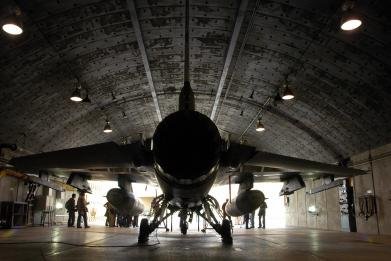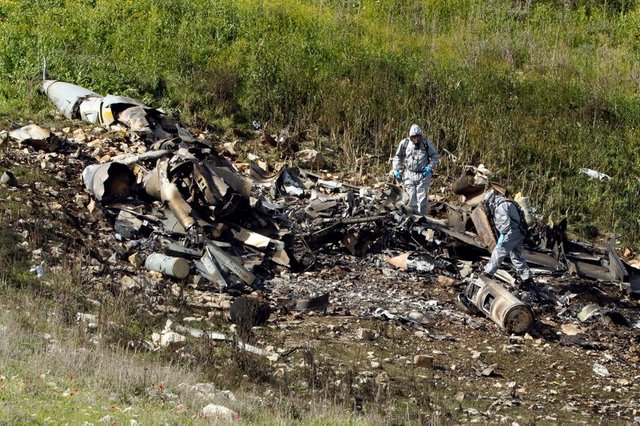
On February 10, an unmanned Iranian observation air ship lifted off from an army installation in focal Syria and infiltrated Israeli airspace over the Golan Heights. An Israeli Apache helicopter followed the automaton, shot it and shot it from the sky with an aerial rocket. Israeli warplanes at that point thundered into Syria and besieged the army installation where the automaton had been propelled, wrecking an Iranian control focus. In the midst of the strike, Syrian hostile to flying machine rockets shot down an Israeli F-16, the principal Israeli contender brought down since 1982.
It was two months previously Israel reacted, however on April 9, after Prime Minister Benjamin Netanyahu met with President Donald Trump, Israeli warplanes assaulted Iranian powers in Syria head-on. Notwithstanding crushing extra Iranian automatons, the Israelis wiped out a propelled Iranian air-protection framework that had been dispatched from Tehran to Syria and executed seven individuals from Iran's world class Quds Force, including the administrator of the automaton unit.
Hard as it is to understand, these encounters amongst Israel and Iran speak to yet another contention on the blood-doused battleground of Syria.
The nation is now host to one war between government troops and Sunni revolts; another between a U.S.- prepared Arab volunteer army and the Islamic State activist gathering (ISIS); and a third setting attacking Turkish troops against Kurdish warriors. However even following seven years of battling that have left a large portion of a million dead and removed 66% of Syria's 18 million individuals, the nation is preparing itself for a fourth war, this one amongst Israel and the Iranian powers that have set up a sizable military nearness in Syria. As the two sides exchange military blows there, present and previous Israeli authorities caution that a bigger fight between the Jewish state and its archnemesis in Tehran is simply a question of time. "The encounter with Iran is unavoidable," previous Major General Yaakov Amidror as of late told the Israeli every day Yediot Ahronot.
Military examiners in Washington concur. "The pattern line that the two nations are taking appears to be traveled toward a genuine conflict," Michael Eisenstadt, chief of military and security learns at the Washington Institute for Near East Policy, a research organization with close connections to the Israeli military, tells Newsweek.
On April 29, Israel affirmed those expectations by and by when its military air ship assaulted and obliterated a noteworthy Iranian weapons reserve close to the Syrian city of Hama that included surface-to-surface rockets. The blasts enrolled as a 2.6-greatness tremor in the Hama zone, the European-Mediterranean Seismological Center said.
The assault, which Syrian authorities said slaughtered 16 individuals, including 11 Iranians positioned at the base, may have been a push to keep an Iranian reaction to Israel's prior strike against the airbase, Israeli investigators said.
Eisenstadt and different experts say that dynamic started to create as far back as 2012, when Israeli warplanes started assaulting shipments of Iranian rockets and different weapons after the equipment had touched base via air in Damascus and was being trucked overland to Hezbollah, Iran's intermediary local army in Lebanon. In the course of recent years, Israeli warplanes have shelled these weapons guards in excess of 100 times, Israeli authorities now recognize.

However, those airstrikes spoke to roundabout assaults on Iran, some portion of a shadowy war between the two adversaries that additionally included Israeli cyberattacks on Iran's atomic program and deaths in Europe of Iranian atomic researchers. Israel shunned assuming praise to abstain from inciting Iranian countering. At the point when Iran struck back, it likewise acted by implication, utilizing intermediaries to strike at inaccessible Israeli targets, for example, the assaults in 2012 on Israeli ambassadors in India, Turkey, Thailand and the Republic of Georgia.
That shadowy dynamic changed when Iranian powers sent their automaton into Israel, getting under way the retaliatory Israeli airstrikes. At first, Israel didn't assert credit for the April 9 assault, which came only five days before the U.S., Britain and France propelled rockets against three Syrian concoction weapons offices in light of a charged Syrian toxic substance gas assault on a Damascus suburb. It was Russia that distinguished the Israelis.
In any case, from that point forward, Israeli military authorities have conceded they propelled their assault because of what they considered to be an endeavored Iranian strike against Israel. The proof: According to The New York Times, encourage Israeli investigation of the film of the Iranian observation ramble that entered Israeli airspace back in February indicated it was conveying explosives. "The person who takes this way should realize that it closes with a troublesome war," said Amidror.
Newsweek has been not able affirm the veracity of the Israeli claim, however occasions on the ground have rendered it a debatable issue. Iranian authorities have promised exact retribution. The central issue now is the means by which General Qasem Soleimani, authority of the Quds Force will react.

Eisenstadt, who has firmly examined Soleimani's strategies, says he expects the Iranian military pioneer will press ahead with his procedure to transform Syria into a rocket stage against Israel. The part of the evaluated 2,000 Iranian troops now in Syria, he includes, is to set up the military framework for that undertaking, including processing plants to deliver refined GPS-guided rockets with expanded exactness to hit high-esteem military and financial focuses in Israel. When this has been refined, he stated, Soleimani will turn these bases over to Hezbollah and united Shiite volunteer armies. "The objective is to encompass Israel on relatively every agree with intermediaries furnished with rockets to have the capacity to assault Israel," Eisenstadt says. "He needs to do in Syria what he improved the situation Hezbollah in Lebanon and, to a lesser degree, for Hamas in Gaza."
As Israel supports for Iran's reaction, its military authorities have pledged they won't enable Iran to do in Syria what it did in Lebanon, which was arm Hezbollah with enough rockets so the Lebanese Shiite local army gave Israel a genuine danger. Israel in the end went to war against Hezbollah in 2006, bringing about monstrous harm to Lebanon's foundation, a stinging hit to Hezbollah's political ubiquity in Lebanon and a continuing condition of quiet along Israel's northern outskirt. In any case, Israeli military knowledge gauges Hezbollah now has in excess of 120,000 rockets in southern Lebanon that could be released in any war amongst Israel and Iran.
As Iranian powers populate forward air bases in Syria, Israeli military authorities as of late showed they are drawing up target records for counterstrikes against an expansive scope of Iranian army bases in Syria. These authorities as of late exposed satellite pictures and a guide indicating five air bases in Syria that Iran purportedly utilizes for its automatons and freight flying machine. The authorities likewise gave the names of three senior Iranian Revolutionary Guard officers supposedly directing rocket units and related undertakings in Syria. Eisenstadt says the divulgence was a reasonable cautioning to Iran. "The message is 'You're completely uncovered. On the off chance that you strike back, these objectives are straightaway,'" he said.
A year ago, Israel's territory, air, maritime and insight powers likewise directed their biggest military activities in two decades along the nation's northern outskirt in what was viewed as arrangements to attack Lebanon in case of another war with Hezbollah. The point of any intrusion, Israeli military authorities stated, would be to "vanquish Hezbollah" with the goal that it "either has no capacity or want to assault any longer."

Another risk is the danger that Israeli and Russian powers in Syria could get into a fight amid any future Israeli airstrikes against Syria. Russian authorities as of late declared that Moscow will soon supply Syrian President Bashar al-Assad with cutting edge S-300 air barrier rocket frameworks. They include that if Israel assaults these rocket frameworks, it will endure what an authority called "disastrous results."
Israeli Defense Minister Avigdor Lieberman tossed the danger appropriate back at the Russians. "One thing ought to be clear," he disclosed to Yediot Ahronot. "On the off chance that somebody fires on our planes, we will wreck them. What's essential to us is that the weapons frameworks that the Russians exchange to Syria are not utilized against us. In the event that they are utilized against us, we will act against them. It doesn't make a difference what framework—S-300, S-700 or something different."
Dennis Ross, a previous Middle East counsel to both Republican and Democratic presidents, takes note of that while Israel, Iran and now Russia are rattling their sabers, Trump has freely expressed his aim to pull U.S. troops out of Syria, a declaration that Ross says has "encouraged Iran and Russia and flagged Israel that it's without anyone else."
"As time passes by, the potential for war increments, and it increments decisively on the grounds that the U.S. is on the sidelines," Ross tells Newsweek. "Furthermore, with the U.S. on the sidelines, Israel can't send its signs with words; it needs to send them with activities." He adds that Trump's dangers to haul out of the 2015 Iran atomic arrangement and reimpose authorizes on Tehran play under the control of Iranian hard-liners like Soleimani, who never believed the United States in any case and sees the Quds Force as the initiate of Iran's drive to overwhelm the Middle East and stand up to Israel.
As far back as Israel's establishing in 1948, its safeguard powers have taken after an announcement found in the Babylonian Talmud, the fourth-century abstract of Jewish religious law and philosophy: "When an adversary stirs early in the day to kill you, wake up prior and kill him first." As the pressures with Iran heighten, that counsel shows up, by and by, to be Israel's request of the day.
Great article. Thank you for your critical thought. I'm upvoting this and gonna follow you. peace brother.
Downvoting a post can decrease pending rewards and make it less visible. Common reasons:
Submit
Peace
Downvoting a post can decrease pending rewards and make it less visible. Common reasons:
Submit